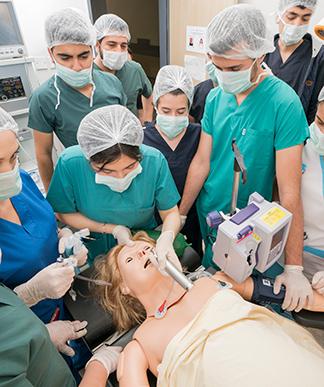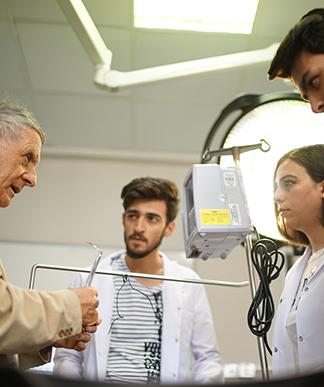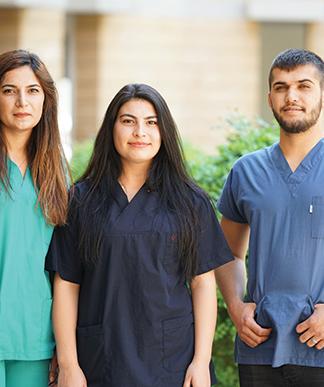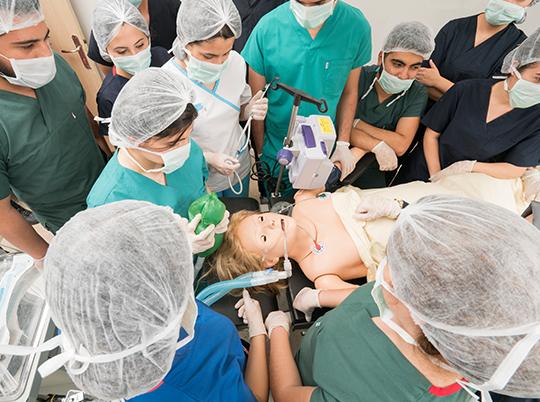


About the Program
The task of anesthesia technicians is to assist the authorized anesthesiologist in the health sector, take part in patient preparation and to be in the nearest hospital, i.e. in the operating room, during the procedure. The anesthesia program graduates are trained to be very close to the patient, be familiar with his or her illness, the drugs to be used, and what the conditions are. Our training program aims to provide the students with the necessary knowledge and skills in this field. It is important to train technicians who will be able to perform preoperative patient preparation, support the anesthesiologist during surgery, and undertake patient control and supervision after the operation. Apart from advanced anesthesia machines and different anesthesia techniques, students are also taught about sterilization and emergency patient care.
Educational Opportunities
A strong academic and physical infrastructure has been prepared for this program. Students also have summer internships in addition to their yearly practices related to their professions. There is a wide range of possibilities as internship for students. There are possibilities of reinforcement during the semester practices with experienced instructors to apply the learning outcomes. There are many clubs and facilities that support social, cultural and sports activities that students can benefit from in our university. It is one of the greatest advantages of the Department of Anatomy, Department of Occupational Skills Laboratory (Anesthesiology and Reanimation), the Anthropometry Laboratory, Department of Health Sciences, which includes various body analyzers and metabolism measurement devices. Our experienced faculty members are educated with the most up-to-date information and continue to develop professionally.

Career Areas
The graduates of the program earn the title of anesthesia technician by completing all the required professional practices and internships in the program. Currently, the hospitals in TRNC and Turkey have operating rooms and these units need trained staff. A large part of the existing graduate anesthesia technicians have been recruited by the Ministry of Health. Private hospitals, polyclinics, laboratories, medical centers, dispensaries, health centers, community health centers constitute the main employment alternatives for the graduates of this program.
Contact
Vocational School of Health Sciences
Çevik Uraz Center, CU206
Tel: +90 392 671 1111 Extension: 2251
School E-mail: secretary-vhs@ciu.edu.tr
Director E-mail: aozada@ciu.edu.tr
Compulsory Courses
First Semester
BASIC ANATOMY
Course code
ANAT100Credit
2Theoretical
2Practical
0Ects
4BASIC ANESTHESIA
Course code
ANST105Credit
2Theoretical
2Practical
0Ects
3ANESTHESIA PRACTICE-I
Course code
ANST107Credit
3Theoretical
3Practical
0Ects
4GENERAL PHARMACOLOGY
Course code
ECZN210Credit
2Theoretical
2Practical
0Ects
2INTRODUCTION TO PHYSIOLOGY
Course code
FIZY100Credit
2Theoretical
2Practical
0Ects
4HISTORY OF CIVILIZATION
Course code
HIST100Credit
0Theoretical
2Practical
0Ects
2ELEMENTARY ENGLISH-I
Course code
INGL123Credit
3Theoretical
3Practical
0Ects
4FREE ELECTIVE
Course code
SSECXX1Credit
2Theoretical
2Practical
0Ects
5MODERN TURKISH HISTORY
Course code
TARH100Credit
0Theoretical
2Practical
0Ects
2TURKISH LANGUAGE
Course code
TREG100Credit
0Theoretical
2Practical
0Ects
2TURKISH
Course code
TURK100Credit
0Theoretical
2Practical
0Ects
2Second Semester
CLINICAL ANESTHESIA-I
Course code
ANST102Credit
3Theoretical
2Practical
2Ects
4REANIMATION-I
Course code
ANST104Credit
3Theoretical
2Practical
2Ects
4ANESTHESIA PRACTICE-II
Course code
ANST110Credit
4Theoretical
2Practical
4Ects
5BASIC COMPUTING
Course code
BILT110Credit
3Theoretical
3Practical
0Ects
4ELEMENTARY ENGLISH-II
Course code
INGL124Credit
3Theoretical
3Practical
0Ects
4FREE ELECTIVE
Course code
SSECXX2Credit
2Theoretical
2Practical
0Ects
5UNIVERSITY ELECTIVE
Course code
UNISXX1Credit
3Theoretical
3Practical
0Ects
4Third Semester
SUMMER TRAINING
Course code
ANST200Credit
0Theoretical
0Practical
0Ects
5CLINICAL ANESTHESIA-II
Course code
ANST201Credit
4Theoretical
2Practical
4Ects
5REANIMATION-II
Course code
ANST205Credit
3Theoretical
2Practical
2Ects
4ANESTHESIC PHARMACOLOGY
Course code
ANST207Credit
3Theoretical
3Practical
0Ects
5ELECTROCARDIOGRAPHY
Course code
SGBL150Credit
2Theoretical
2Practical
0Ects
2FREE ELECTIVE
Course code
SSECXX3Credit
2Theoretical
2Practical
0Ects
5UNIVERSITY ELECTIVE
Course code
UNISXX2Credit
3Theoretical
3Practical
0Ects
4Fourth Semester
VOCATIONAL PRACTICE
Course code
ANST202Credit
10Theoretical
0Practical
20Ects
20ALAN SEÇMELI
Course code
ANSTXX1Credit
2Theoretical
2Practical
0Ects
5ALAN SEÇMELI
Course code
ANSTXX2Credit
2Theoretical
2Practical
0Ects
5Elective Courses
OCCUPATIONAL HEALTH AND SAFETY
Course code
ISAG230Credit
2Theoretical
2Practical
0Ects
2MEDICAL TERMINOLOGY
Course code
SGBL130Credit
2Theoretical
2Practical
0Ects
KNOWLEDGE OF BASIC DISEASES
Course code
SGBL107Credit
3Theoretical
3Practical
0Ects
BEHAVIORAL SCIENCES IN HEALTH
Course code
SGBL280Credit
2Theoretical
2Practical
0Ects
PUBLIC HEALTH AND MEDICAL DEONTOLOGY
Course code
SGBL202Credit
2Theoretical
2Practical
0Ects
3PUBLIC HEALTH AND MEDICAL DEONTOLOGY
Course code
SGBL202Credit
2Theoretical
2Practical
0Ects
3BEHAVIORAL SCIENCES IN HEALTH
Course code
SGBL280Credit
2Theoretical
2Practical
0Ects
INFECTION DISEASE
Course code
SGBL160Credit
2Theoretical
2Practical
0Ects
3TRNC Applicants
TRNC citizens and TR citizen candidate students who have completed their entire high school education in TRNC. They are placed in undergraduate programs in line with their success in the CIU Student Placement and Scholarship Ranking Exam and the programs they prefer.
Students who are successful in the exam can register from the TRNC Marketing Office.
TR Applicants
TR Students who are successful in the exams conducted by the Higher Education Council Student Selection and Placement Center (ÖSYM) and are entitled to enroll in our university in line with their preferences can complete the registration process with the necessary documents for registration from our Registration and Liaison Offices throughout Turkey or from the Marketing Directorate on campus.
Click for detailed admission requirements information.
Tuition Fees are determined at the beginning of each academic year. Candidate students who are entitled to enroll in CIU can learn their fees in line with the Tuition Fee Calculation system.